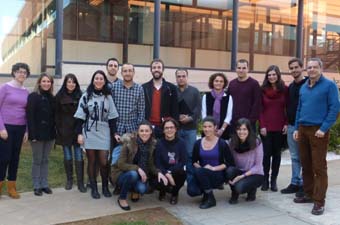
Researchers of the Cavanilles Institute of Biodiversity and Evolutionary Biology of the Universitat de València have shown that the mutation speed of the AIDS virus is a hundred times higher in the patients than expected, considering the data previously obtained at the laboratory. The conclusions of this work have just been published in ‘PLoS Biology’.
The cellular enzyme APOBEC is the responsible of this high mutation of the VIH virus since it changes the bases of the virus genome. Professor Rafael Sanjuán, leader of this study, argues that, on the one hand, APOBEC “inhibits the virus, inactivates it, that is, delays the development of the disease. And on the other hand, in a parallel way and due to a small part of mutated genes, promotes the evolution of the virus, consequently this presents a bigger resistance both to drugs and to the immune system”. “The immunity that APOBECS provides to the AIDS virus makes it to mutate faster”, explains the researcher.
Sanjuán emphasises that this work about the mutation rate of the AIDS virus is the first one to be carried out in vivo, with patients, due to the prior analysis were carried out in vitro. In fact, the study –financed by an ERC Starting Grant European project, whose main researcher is Sanjuán– had the data of eleven people infected with the HIV virus, who come from the AIDS Research Network (RIS) and from the University and Polytechnic Hospital La Fe in Valencia.
BEST ANTIVIRAL STRATEGIES
The results of this research are important to understand and deal with AIDS, since they show a correlation between the virus mutation and the disease progression. “The understanding of how the mutation is produced in the VIH virus will provide better antiviral strategies”, according to the researcher.
Rafael Sanjuán is tenured university professor at the Department of Genetics and researcher of the Evolution and Health Group of the Cavanilles Institute of Biodiversity and Evolutionary Biology of the Universitat de València. The investigation in his group focuses on the study of the mechanisms responsible for the creation and maintenance of the genetics variation in virus such as HIV or hepatitis C. Sanjuán is currently the main researcher of three national and international projects and has published about sixty research works on evolution and virus during the last ten years.
José M. Cuevas, Ron Geller, Raquel Garijo, José López-Aldeguer, Rafael Sanjuán (2015). Extremely high mutation rate of HIV-1 in vivo. Plos Biology 13(9): e1002251.
Last update: 17 de september de 2015 07:00.
News release



















